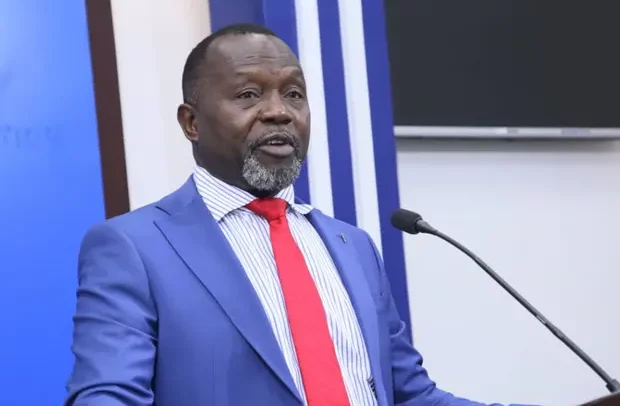Dr. Dominic Ayine
The Attorney General and Minister for Justice, Dr. Dominic Ayine, has provided justification for discontinuing the trial of former Governor of the Bank of Ghana (BoG) and founder of defunct uniBank Ghana Limited, Kwabena Duffour and seven others.
According to him, the initial figure of GH¢5.7 billion for which the accused persons, including the current Governor of the BoG, Johnson Pandit Asiama were standing trial for fraudulent breach of trust, money laundering and other charges, was eventually reduced to GH¢3.3 billion during a reconciliation exercise.
Taking his turn at the Government Accountability Series yesterday at the Presidency, Dr. Ayine stated that the revised figure excluded GH¢2.1 billion in an alleged fictitious amounts booked to the account of the shareholder, which did not involve cash outflows.
“In other words, monies didn’t go out to anybody. These were just book entries that were designed to make the books of uniBank look good,” he indicated.
Dr. Ayine further stated that “so, they did not loot the money, they did not give the money to anybody, they just made entries that were meant to give Bank of Ghana, the Central Bank the impression that the bank was doing well.”
Nolle Prosequi
The Attorney General and Minister for Justice, Dr. Dominic Ayine last Tuesday entered nolle prosequi in the trial of the founder of uniBank Ghana Limited, Dr. Kwabena Duffour and seven others for their role in the collapse of the bank.
This, according to a statement issued by Deputy Attorney General, Dr. Justice Srem-Sai, followed a significant 60% recovery of the total money lost through the actions of the accused persons.
He, however, indicated that the decision to drop the charges against them “does not imply an absence of wrongdoing nor a vindication of any conduct. It is a pragmatic step in line with the overarching national interest of recovering state resources.”
The decision however, drew significant public backlash with some calling it a bad precedent which will embolden public officials to loot state resources, knowing they could refund 60% and walk away freely with almost half of the booty without any consequences.
Justification
But Dr. Ayine, speaking at a press conference yesterday, noted that the decision to drop the charges and pursue an agenda of recovering funds is not as easy and simplistic as critics are suggesting.
According to him, in assessing the proposal presented by lawyers for the accused persons which ultimately led to his decision, he took into account various factors, including the fact that both the criminal and civil cases initiated against the accused persons have persisted for over six years with no immediate resolution in sight.
He also pointed out that the complex nature of the legal proceedings has significantly delayed any meaningful recovery.
“While the criminal prosecution was intended to serve as a punitive and deterrent measure, it is through the civil process that actual recovery of funds is effectively pursued. The Accused Persons’ proposal fell within the Receiver’s mandate to maximise recoveries for uniBank in order to settle the Bank’s creditors, mainly Government of Ghana and some of its institutions,” he said.
Payment Terms
Dr. Ayine revealed that as part of the agreement with the accused persons, GH¢800 million worth of assets are to be transferred directly to uniBank, while they have indicated their active cooperation and participation to assist the Receiver to recover an additional GH¢1.2 billion from the direct beneficiaries, paid out on their instructions.
The accused persons will also be responsible for any shortfall in the proceeds realised from the sale of the landed properties.
Again, a total of GH¢500 million has, to date, been recovered out of the GH¢1.2 billion being pursued from the direct beneficiaries.
Recovery of the remaining balance of GH¢700 million and realisation of the landed properties provided are expected to be completed over a timeline of 18 months.
“Although the preference would have been for the Accused Persons to settle the proposed amount in cash, immediate settlement in cash was not, from my sense of what transpired at the negotiations, a realistic option,” Dr. Ayine added.
BY Gibril Abdul Razak


